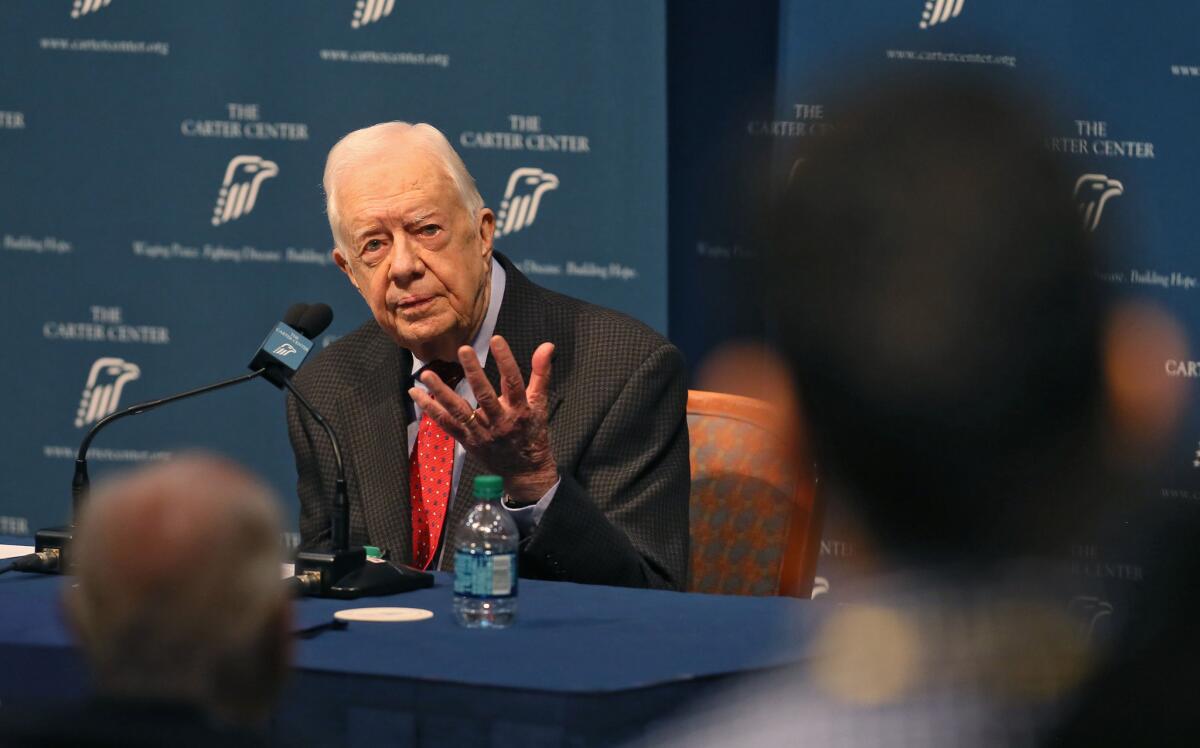Jimmy Carter has one very big regret. Most presidents are right there with him.

Former President Jimmy Carter discusses his cancer diagnosis at the Carter Center in Atlanta.
Reporting from Washington — As former President Carter told reporters Thursday that cancer had spread to his brain, he reflected on his life and was asked whether he had any regrets. The 90-year-old’s answer was blunt and candid.
“I wish I had sent one more helicopter to get the hostages, and we would have rescued them, and I would have been reelected,” a grinning Carter said, referencing the failed mission to rescue 52 hostages held in Iran that some believe dashed his chances of serving a second term.
While Carter’s comment was striking, acknowledgments of a major mistake from a president -- sitting or former -- are not as rare as it might seem. Almost every modern president has acknowledged, and often apologized for, some blunder under his watch.
Apologies have become a regular part of the life cycle of a White House scandal, and as such they don’t have the political impact they once did. Sometimes they can feel about as sincere as a losing candidate’s concession speech on election night. Still, some are revealing, awkward or historic. The most notable presidential regrets:
> President Ronald Reagan on Iran-Contra: Another hostage crisis led to Reagan’s most memorable apology. Behind the desk in the Oval Office in March 1987, Reagan admitted his sub-par “management style” led his subordinates to cook up an illegal hostages-for-arms scheme. Reagan’s address had many memorable lines that historians say offer some insight into the president’s thinking. (“I told the American people I did not trade arms for hostages. My head and my best intentions still tell me that’s true, but the facts and the evidence tell me it is not.”) The key section is considered a model for future regretful presidents:
“I let my personal concern for the hostages spill over into the geopolitical strategy of reaching out to Iran. I asked so many questions about the hostages’ welfare that I didn’t ask enough about the specifics of the total Iran plan,” he said, adding later: “Now, what should happen when you make a mistake is this: You take your knocks, you learn your lessons, and then you move on. That’s the healthiest way to deal with a problem.… You know, by the time you reach my age, you’ve made plenty of mistakes. And if you’ve lived your life properly -- so, you learn. You put things in perspective. You pull your energies together. You change. You go forward.”
> President George H.W. Bush on “no new taxes”: In 1988, Bush told voters to read his lips, “no new taxes.” Two years later, he cut a deal with Democrats that raised taxes. Two years after that, on the ropes in his reelection bid, he told voters maybe he should not have done that.
“If I had it to do over, I wouldn’t do what I did then, for a lot of reasons, including political reasons,” he said. “I did it and I regret it and I regret it.”
Democrats at the time said Bush was merely regretting the political consequences, a sign of his weakness. Bush didn’t necessarily make the case otherwise, adding this moment of bare honesty to the annals of politics: “Anytime you get hammered on something, I guess you want to redo it.”
> President Bill Clinton on Monica Lewinsky. Clinton also took to TV to make his big admission. In August 1998, after months of denial, Clinton acknowledged having a “wrong” relationship with the White House intern.
“I misled people, including even my wife. I deeply regret that,” Clinton said. “I intend to reclaim my family life for my family.”
By that time, Clinton was practiced in the art and the power of the apology. He’d already revived his political career by acknowledging he’d made a mistake in raising fees as governor of Arkansas. After losing his office in 1980, Clinton came back with an ad famous for its apparent humility and foreshadowing.
“When I was a boy growing up, my daddy never had to whip me twice for the same thing,” Clinton said in the ad.
> President George W. Bush on Katrina -- and not on Iraq: While in office, Bush became known for resisting moments of public introspection. Since leaving the White House, he’s acknowledged some relatively minor blunders, while defending his most contentious moves. Although most in his party -- including his brother Jeb -- now say the invasion of Iraq was a mistake, Bush has not.
“No, I think it was the right decision,” Bush told CBS’ Bob Schieffer last year. “My regret is that -- a violent group of people have risen up again. This is ‘Al Qaeda-plus’ ... they need to be defeated. And I hope we do. It’s -- I hope that the strategy works.”
His post-presidential memoir includes two admissions of mistakes, both largely public relations disasters: declaring “mission accomplished” in Iraq about a decade too early and flying over New Orleans to view the aftermath of Hurricane Katrina from above.
“It reinforced damage that was taking place,” Bush told NBC. “I had failed to get Congress to move on Social Security. Iraq was still very difficult. And so Katrina came along and it gave critics an opportunity to kind of undermine the presidency I guess.”
> President Obama on his healthcare website rollout: The Obama administration so badly botched the rollout of the president’s signature domestic policy that there was little the president could do but go the humble route. His admissions took many forms:
“We fumbled the rollout on this healthcare law”
“There’s no sugarcoating it.… There’s no excuse for the problems.”
Twitter: @khennessey
More to Read
Get the L.A. Times Politics newsletter
Deeply reported insights into legislation, politics and policy from Sacramento, Washington and beyond. In your inbox three times per week.
You may occasionally receive promotional content from the Los Angeles Times.











